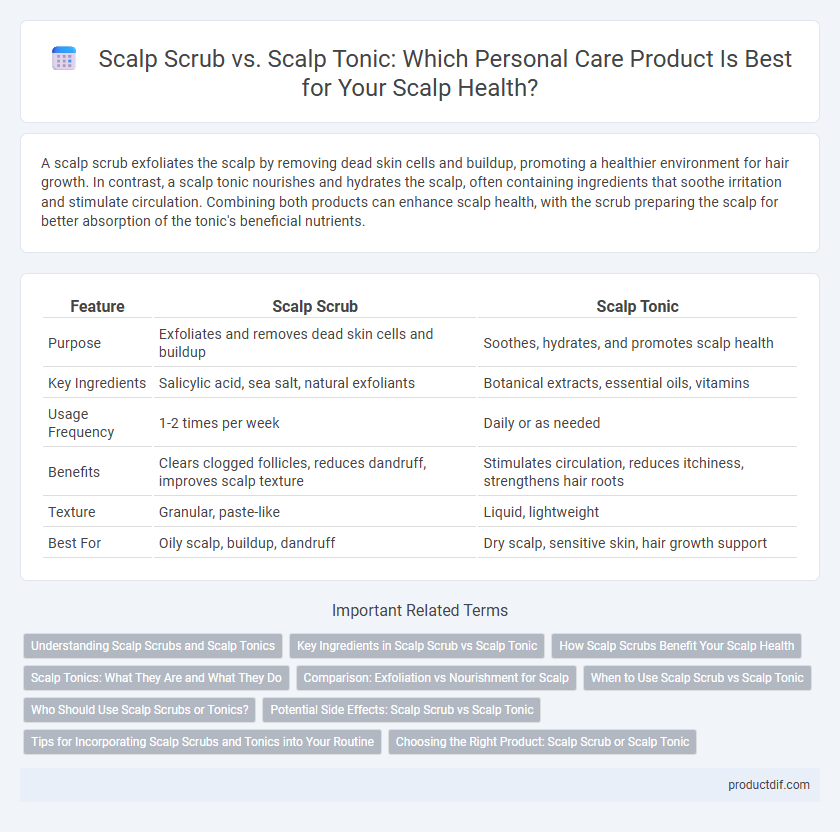A scalp scrub exfoliates the scalp by removing dead skin cells and buildup, promoting a healthier environment for hair growth. In contrast, a scalp tonic nourishes and hydrates the scalp, often containing ingredients that soothe irritation and stimulate circulation. Combining both products can enhance scalp health, with the scrub preparing the scalp for better absorption of the tonic's beneficial nutrients.
Table of Comparison
| Feature | Scalp Scrub | Scalp Tonic |
|---|---|---|
| Purpose | Exfoliates and removes dead skin cells and buildup | Soothes, hydrates, and promotes scalp health |
| Key Ingredients | Salicylic acid, sea salt, natural exfoliants | Botanical extracts, essential oils, vitamins |
| Usage Frequency | 1-2 times per week | Daily or as needed |
| Benefits | Clears clogged follicles, reduces dandruff, improves scalp texture | Stimulates circulation, reduces itchiness, strengthens hair roots |
| Texture | Granular, paste-like | Liquid, lightweight |
| Best For | Oily scalp, buildup, dandruff | Dry scalp, sensitive skin, hair growth support |
Understanding Scalp Scrubs and Scalp Tonics
Scalp scrubs exfoliate the scalp by removing dead skin cells, excess oil, and buildup, promoting a healthier environment for hair growth. Scalp tonics, on the other hand, deliver nourishing ingredients and hydration directly to the scalp, enhancing circulation and maintaining scalp balance. Both products target scalp health but serve distinct purposes: scrubs detoxify while tonics soothe and nourish.
Key Ingredients in Scalp Scrub vs Scalp Tonic
Scalp scrubs typically contain exfoliating agents like salicylic acid, sugar crystals, or sea salt to remove dead skin cells and unclog follicles, promoting a clean and refreshed scalp. Scalp tonics often feature soothing and stimulating ingredients such as tea tree oil, peppermint oil, and niacinamide to nourish the scalp, reduce inflammation, and improve blood circulation. Both products target scalp health but differ in key components, with scrubs focusing on physical exfoliation and tonics emphasizing hydration and scalp balance.
How Scalp Scrubs Benefit Your Scalp Health
Scalp scrubs exfoliate the scalp by removing dead skin cells, excess oil, and buildup from hair products, promoting healthier hair growth and reducing dandruff. They stimulate blood circulation, which can improve nutrient delivery to hair follicles and enhance overall scalp vitality. Regular use of scalp scrubs helps maintain a clean, balanced scalp environment, preventing issues like itchiness and flakiness commonly associated with scalp imbalances.
Scalp Tonics: What They Are and What They Do
Scalp tonics are lightweight liquid treatments designed to nourish the scalp, stimulate blood circulation, and promote healthy hair growth by delivering active ingredients like essential oils, vitamins, and botanical extracts. Unlike scalp scrubs, which exfoliate dead skin cells and remove buildup, scalp tonics focus on maintaining scalp hydration, balancing oil production, and soothing irritation or inflammation. Regular use of scalp tonics can improve scalp health, reduce dandruff, and create an optimal environment for stronger, shinier hair.
Comparison: Exfoliation vs Nourishment for Scalp
Scalp scrubs provide deep exfoliation by removing dead skin cells, excess oil, and product buildup, promoting a cleaner and healthier scalp environment. Scalp tonics focus on nourishment by hydrating the scalp and delivering vitamins and botanicals that stimulate hair growth and improve scalp health. Choosing between exfoliation with a scrub or nourishment with a tonic depends on addressing specific scalp needs such as detoxification or revitalization.
When to Use Scalp Scrub vs Scalp Tonic
Use a scalp scrub to exfoliate and remove buildup, ideal for weekly treatments to unclog hair follicles and stimulate circulation. Apply a scalp tonic daily or after washing to hydrate, soothe irritation, and promote healthier hair growth. Scalp scrubs target deep cleansing, while tonics support ongoing scalp health and balance.
Who Should Use Scalp Scrubs or Tonics?
Scalp scrubs are ideal for individuals with oily scalps, dandruff, or buildup from hair products, as they exfoliate and cleanse deeply to promote healthy hair growth. Scalp tonics suit those experiencing dryness, irritation, or sensitivity by soothing and moisturizing the scalp while enhancing circulation. Both products support scalp health but target different concerns, making choice dependent on specific scalp conditions.
Potential Side Effects: Scalp Scrub vs Scalp Tonic
Scalp scrubs can cause irritation or sensitivity if used too frequently due to their exfoliating particles, potentially leading to redness or flakiness. Scalp tonics, depending on their ingredients such as alcohol or strong fragrances, may cause dryness or allergic reactions in sensitive individuals. Choosing a product with gentle, natural components minimizes the risk of adverse effects on scalp health.
Tips for Incorporating Scalp Scrubs and Tonics into Your Routine
Incorporate scalp scrubs once or twice a week to exfoliate and remove buildup, promoting healthy hair follicles and improved scalp circulation. Use scalp tonics daily after washing to nourish, hydrate, and balance the scalp's natural oils, enhancing hair strength and shine. For best results, apply the scrub on damp hair using gentle circular motions, rinse thoroughly, then follow with a tonic applied directly to the scalp and massaged in to maximize absorption.
Choosing the Right Product: Scalp Scrub or Scalp Tonic
Scalp scrubs exfoliate the scalp by removing dead skin cells and buildup, promoting healthier hair growth and reducing dandruff. Scalp tonics hydrate and soothe the scalp, often containing ingredients like tea tree oil or menthol to stimulate circulation and balance oil production. Choosing between a scalp scrub and a scalp tonic depends on your scalp condition: opt for a scrub to deeply cleanse and exfoliate, or a tonic to nourish and refresh sensitive or dry scalps.
scalp scrub vs scalp tonic Infographic

 productdif.com
productdif.com